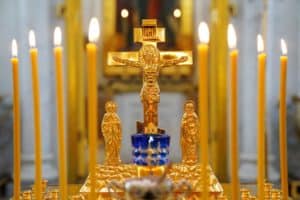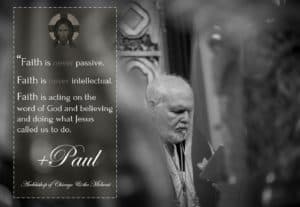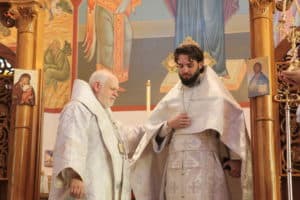The Office of Communications of the Diocese of the Midwest is pleased to announce that we will be offering weekly reflections during this holy season by our Diocesan Chancellor, Archpriest Paul Jannakos. These brief meditations can provide an Orthodox Christian with assistance in seeking more time with God in silence and stillness.
SIXTH MONDAY OF LENT
“Then you shall take it to your father, that he may eat it, and that he may bless you before his death.” (Gen 17:10)
Jacob was Isaac’s younger son. By right, Esau, his first born, should have received his blessing. But Jacob, at the bidding of his mother Rebekah, stole the blessing for himself. Jacob flees from Esau who wants to kill him in revenge. This is the lowest point in Jacob’s life. That night he wrestles with the angel of the Lord in the wilderness near the brook of Jabok. There he receives a new name, “Israel,” which means the one who “wrestles with the Lord.”
Many people struggle to do God’s will.
Life’s lowest points often reveal God’s greatest revelations.
_______________________________
SIXTH TUESDAY OF LENT
“Then the Lord said to Jacob, ‘Return to the land of your fathers and to your family, and I will be with you.’” (Gen 31:3)
By living in exile from his family in Canaan, Jacob foreshadows the future exile of Israel into Egypt. Exile is a constant theme running throughout the Bible. It began with the fall of Adam and Eve and their exile from paradise. But it is brought to an end with the crucifixion of Christ which took place “outside” the walls of Jerusalem. Human beings need no longer to live as strangers and sojourners in a foreign land. Christ reconciles us to the heavenly Jerusalem.
Some people choose a life of permanent exile.
Do you belong to the “Jerusalem from above?”
SIXTH WEDNESDAY OF LENT
“God sent me before you to preserve a posterity for on the earth, to save your lives by a great deliverance.” (Gen 45:7).
Joseph forgave his brothers for having sold him into slavery many years before. He learned that God is just and vindicates His people at the right time. Having been thrown into an Egyptian prison, Joseph is glorified to the right hand of Pharaoh. Looking back on all God had done for him, Joseph recognized God’s plan of salvation for his whole family. His humiliation in the pit and exaltation by Pharaoh point towards the death and resurrection of the Messiah.
Forgiveness reconciled Joseph to his brothers.
How do you react to unjust accusations?
_______________________________
SIXTH THURSDAY OF LENT
“So He said, ‘I am God, the God of your father; do not fear to go down to Egypt, for I will make of you a great nation there.’” (Gen 46:3)
The Lord created the nation of Israel for Himself. But Israel is not a nation made up of a single ethnic identity or language. It is not a nation whose people are of the same blood or genetics. It is not a nation determined by geographical borders. It is not a nation that dominates through the subjugation of lesser nations. The true Israel of God is “a royal priesthood, a holy nation, a chosen people” (1 Peter 2:9).
“Out of Egypt have I called my son.”
Are you a slave in Egypt? (Hosea 11:1).
_______________________________
SIXTH FRIDAY OF LENT
“But as for you, you meant evil against me; but God meant it for good, in order to bring it about as it is this day, to save many people.” (Gen 50:20).
Joseph refuses to play God. He rejects the opportunity to judge his brothers for the evil they inflicted upon him by selling him into slavery as a young boy. In doing so, he breaks the cycle of violence that has beset the human race from the beginning. Through the grace of forgiveness he frees himself from the events of the past. He does not dwell on the remembrance of wrongs done to him by others. He sees the hand of God working in all things.
Every act of forgiveness is a miracle of grace.
Do you hold on to the remembrance of wrongs?
_______________________________
LAZARUS SATURDAY
“Did I not tell you that if you would believe you would see the glory of God?” (John 11:40).
The reward of faith is the glory of God. We are made for such glory, the promise of God’s light, beauty, goodness, and love. Heaven is not a place “up there,” but a state whereby we are immersed in God’s majesty. All those touched by the Holy Spirit receive a foretaste of the divine glory, a “pledge of our future inheritance.” Such glory creates a hunger and thirst which nothing worldly can satisfy. Without God’s glory, we remain in the shadows.
Human beings delight most in the glory of God.
Do you hunger and thirst after His goodness?
_______________________________
PALM SUNDAY
“His disciples did not understand this at first; but when Jesus was glorified, they remembered this had been written of Him and had been done to Him.” (John 12:16).
The disciples were slow to understand. They were unable to grasp the fact that Christ was to be crucified and rise on the third day. All this because they were too shortsighted. It was only after the Resurrection that it all began to make sense. The Cross and the Resurrection are the “lens” by which we learn how to read the Bible backwards. The Lord Himself gives meaning to the Scriptures by showing us “all things concerning Himself.” (Luke 24:27).
Orthodox Christians read the Bible backwards.
Do the Scriptures make sense to you?



